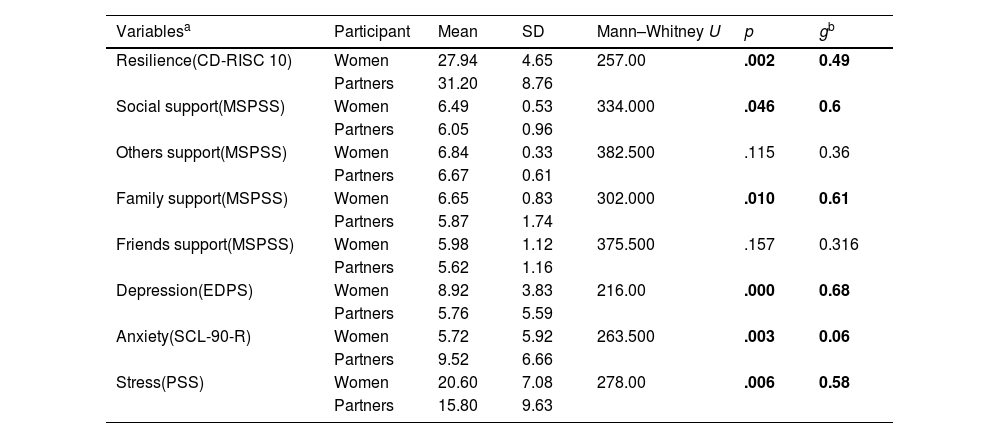Adverse situations can affect the mental health and support of pregnant women and their partners, such as the COVID-19 pandemic and the resulting confinement periods. The main objective of this study was to evaluate the protective factors in the mental health of pregnant women and their partners, as well as the interrelationships of these factors, in an adverse situation, through the assessment of resilience, perceived support, anxiety, depression and stress.
MethodsThe sample consisted of 38 women with no pregnancy risk and 25 partners evaluated between gestation weeks 24 and 31. This is a cross-sectional, descriptive, correlational study.
ResultsThe pregnant women presented lower resilience, greater social support (especially family support), and greater intensity of depression, anxiety and stress than their partners. Moreover, a mutual relationship was found, both in depression and general support, between the members of the couple.
ConclusionDuring the confinement, pregnant women have presented greater vulnerability in mental health, despite perceiving greater social support than their partners. Greater resilience in the partners could be a relevant factor to cope with situation of adversity during pregnancy, as indicated by the relationship detected between the risk and protective factors. It would be desirable to improve the attention and care of pregnant women during prolonged periods of adversity, including the couple, and to strengthen mutual support.
La salud mental de las mujeres embarazadas se ve afectada fundamentalmente por sintomatología ansiosa-depresiva. Situaciones de adversidad pueden afectar en la capacidad de afrontamiento y en los apoyos, también en sus parejas. El objetivo principal fue evaluar los factores de protección en la salud mental de gestantes y sus parejas, así como la interrelación entre ellos en una situación de adversidad. Para ello se evaluó la resiliencia, la percepción de apoyo, la sintomatología ansiosa y depresiva y el nivel de estrés de mujeres embarazadas y sus parejas durante un periodo de confinamiento cerrado.
MétodoEstudio trasversal descriptivo correlacional. La muestra estuvo constituida por 38 gestantes sin riesgo en el embarazo y 25 parejas. Fueron evaluados entre la semana 24 y 31 de embarazo.
ResultadosLas gestantes presentaban menor capacidad de resiliencia, mayor percepción de apoyo social, especialmente apoyo familiar, y mayor intensidad de síntomas depresivos, ansiosos y de estrés que sus parejas. Además, se encontró una relación mutua, tanto en sintomatología depresiva como en apoyo general, entre los miembros de la pareja.
ConclusionesDurante el confinamiento, las gestantes han presentado mayor vulnerabilidad en salud mental, a pesar de percibir mayor apoyo social que sus parejas. Una mayor resiliencia en las parejas podría ser un factor relevante para afrontar situaciones de adversidad durante el embarazo, como indica la relación detectada con los factores de riesgo. Sería deseable mejorar la atención y el cuidado a las mujeres embarazadas durante periodos prolongados de adversidad, incluyendo a la pareja, para reforzar el apoyo mutuo.
Article
Diríjase al área privada de socios de la web de la SEMERGEN, (https://www.semergen.es/index.php?seccion=biblioteca&subSeccion=revistaSEMERGEN ) y autentifíquese.










